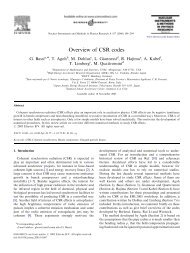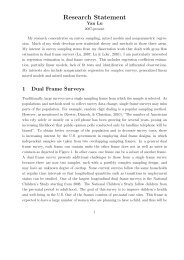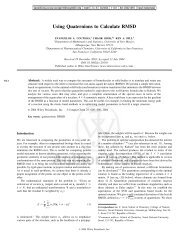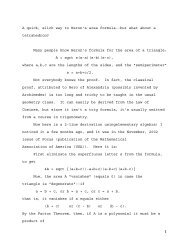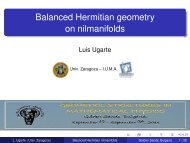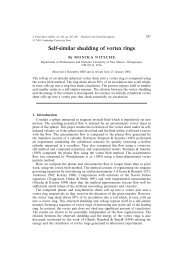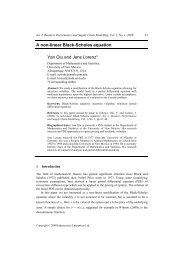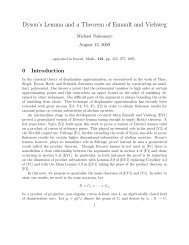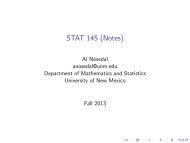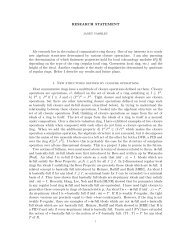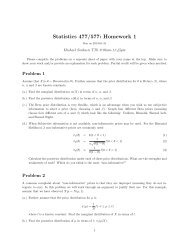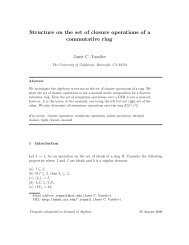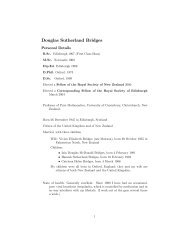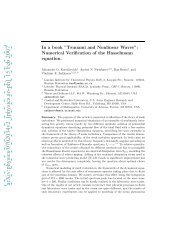OEO Office of Equal Opportunity - Department of Mathematics and ...
OEO Office of Equal Opportunity - Department of Mathematics and ...
OEO Office of Equal Opportunity - Department of Mathematics and ...
You also want an ePaper? Increase the reach of your titles
YUMPU automatically turns print PDFs into web optimized ePapers that Google loves.
260 ARTS AND SCIENCES<br />
543./343. Contemporary Continental Philosophy. (3)<br />
A survey <strong>of</strong> main themes in Dilthey, Husserl, Scheler,<br />
Heidegger, Merleau-Ponty, Sartre, Hermeneutics,<br />
Structuralism, Deconstruction <strong>and</strong> the Frankfurt School.<br />
544./344. Nineteenth-Century Philosophy. (3)<br />
From Kant through Hegel, Marx, Schopenhauer, Kierkegaard,<br />
Mill, Nietzsche.<br />
545./445. Philosophy <strong>of</strong> Language. (3)<br />
Philosophies <strong>of</strong> meaning with special attention to the relations<br />
between language <strong>and</strong> thought.<br />
546./346. Twentieth-Century Philosophy. (3 to a maximum<br />
<strong>of</strong> 12) [3] † ∆<br />
Twentieth-century philosophies.<br />
548./348. Comparative Philosophy. (3)<br />
A comparative study <strong>of</strong> the Buddhist, Chinese, European,<br />
Indian <strong>and</strong> Islamic philosophical traditions with reference to<br />
ontology, epistemology, axiology <strong>and</strong> sociopolitical thought.<br />
549./449. The Bhagavad Gita <strong>and</strong> Yoga. (3)<br />
A study <strong>of</strong> this very important text <strong>of</strong> Hindu thought <strong>and</strong><br />
the philosophies <strong>of</strong> Samkhya <strong>and</strong> Yoga, which serve as its<br />
background.<br />
550./350. Philosophy <strong>of</strong> Science. (3)<br />
This course is a survey <strong>of</strong> the main epistemological, ontological<br />
<strong>and</strong> conceptual issues that arise from or concern the<br />
methodology <strong>and</strong> content <strong>of</strong> the empirical sciences.<br />
551. M.A. Problems. (1-3, repeatable to a maximum <strong>of</strong><br />
6 times) [1-3] ∆<br />
552./352. Theory <strong>of</strong> Knowledge. (3)<br />
Problems <strong>and</strong> theories <strong>of</strong> epistemology.<br />
554. Seminar in Metaphysics & Epistemology. (3 to a<br />
maximum <strong>of</strong> 18) ∆<br />
556. Seminar in Philosophical Logic. (1-6) ∆<br />
This course consists <strong>of</strong> a close examination <strong>of</strong> a topic in<br />
logical theory in the philosophy <strong>of</strong> logic or in a philosophical<br />
area that utilizes the methods <strong>of</strong> logic or is relevant to issues<br />
in logical theory. May be repeated six times for credit providing<br />
topic varies.<br />
558. Seminar in Value Theory. (3 to a maximum <strong>of</strong> 18) ∆<br />
559. [559./359.] Philosophy <strong>of</strong> Biology. (3)<br />
This course consists <strong>of</strong> a close <strong>and</strong> critical examination <strong>of</strong><br />
selected philosophical issues that arise from the methodological<br />
<strong>and</strong> conceptual content <strong>of</strong> evolutionary biology.<br />
560./360. Christian Classics. (3)<br />
(Also <strong>of</strong>fered as RELG 560.) A study <strong>of</strong> major writings in<br />
the Christian tradition, written by such persons as Origen,<br />
Augustine, Aquinas, Luther, Calvin <strong>and</strong> Teresa <strong>of</strong> Avila.<br />
561./361. Modern Christian Thought. (3)<br />
(Also <strong>of</strong>fered as RELG 561.) Background <strong>of</strong> the intellectual<br />
issues facing Roman Catholic <strong>and</strong> Protestant traditions<br />
today.<br />
563./363. Environmental Ethics. (3)<br />
Close reading <strong>of</strong> contemporary writings by naturalists, lawyers,<br />
theologians <strong>and</strong> philosophers on the philosophical<br />
aspects <strong>of</strong> environmental problems.<br />
565./365. Philosophy <strong>of</strong> Religion. (3)<br />
(Also <strong>of</strong>fered as RELG 565.) Philosophic analysis <strong>of</strong> some<br />
major concepts <strong>and</strong> problems in religion.<br />
567./367. Philosophy <strong>of</strong> Art <strong>and</strong> Aesthetics. (3)<br />
Philosophical investigation <strong>of</strong> concept <strong>and</strong> theories <strong>of</strong> art <strong>and</strong><br />
literature. Possible topics include the nature, definition <strong>and</strong><br />
criteria <strong>of</strong> art; its functions; form <strong>and</strong> content; aesthetic experience;<br />
evaluation; artist’s/author’s status; meaning; reception;<br />
hermeneutics <strong>and</strong> representation.<br />
571./371. Classical Social <strong>and</strong> Political Philosophy. (3)<br />
From Plato to Hobbes.<br />
572./372. Modern Social <strong>and</strong> Political Philosophy. (3)<br />
From Hobbes to present.<br />
580./480. Philosophy <strong>and</strong> Literature. (3 to a maximum<br />
<strong>of</strong> 12) ∆<br />
Selected philosophical movements <strong>and</strong> their relationships to<br />
literary masterpieces.<br />
581./381. Philosophy <strong>of</strong> Law <strong>and</strong> Morals. (3)<br />
Nature <strong>and</strong> function <strong>of</strong> public law <strong>and</strong> its relation to moral<br />
belief.<br />
584./384. Philosophy <strong>of</strong> Mind. (3)<br />
A study <strong>of</strong> certain issues connected with the nature <strong>and</strong><br />
status <strong>of</strong> minds.<br />
585./485. Philosophical Foundations <strong>of</strong> Economic<br />
Theory. (3)<br />
Prerequisites: ECON 105, 106.<br />
588./388. Topics in Brazilian Thought. (3)<br />
A philosophical analysis <strong>of</strong> selected topics from Brazilian<br />
intellectual history <strong>and</strong> contemporary Brazilian thought in<br />
the areas <strong>of</strong> art, economics, literature, philosophy, politics,<br />
religion, theatre <strong>and</strong> society.<br />
589./389. Latin American Thought I. (3)<br />
Pre-Columbian thought through independence ideologies.<br />
590./390. Latin American Thought II. (3)<br />
Positivism through contemporary thought.<br />
599. Master’s Thesis. (1-6)<br />
Offered on a CR/NC basis only.<br />
651. Ph.D. Problems. (1-3, repeatable to a maximum <strong>of</strong><br />
6 times) ∆<br />
699. Dissertation. (3-12)<br />
Offered on a CR/NC basis only.<br />
PHILOSOPHY-ECONOMICS<br />
See Economics-Philosophy.<br />
PHILOSOPHY-ENGLISH<br />
See English-Philosophy.<br />
PHYSICS AND ASTRONOMY<br />
Bernd Bassalleck, Chairperson<br />
Physics <strong>and</strong> Astronomy Building, Room 100<br />
MSC07 4220<br />
1 University <strong>of</strong> New Mexico<br />
Albuquerque, New Mexico 87131-0001<br />
(505) 277-2616, FAX (505) 277-1520<br />
Web site: http://p<strong>and</strong>a.unm.edu<br />
Distinguished Pr<strong>of</strong>essor<br />
V. M. Kenkre, Ph.D., State University <strong>of</strong> New York<br />
(Stony Brook)<br />
Pr<strong>of</strong>essors<br />
Harjit S. Ahluwalia, Ph.D., University <strong>of</strong> Gujarat<br />
Bernd Bassalleck, Ph.D., University <strong>of</strong> Karlsruhe<br />
Kevin E. Cahill, Ph.D., Harvard University<br />
Carlton M. Caves, Ph.D., California Institute <strong>of</strong> Technology<br />
Ivan H. Deutsch, Ph.D., University <strong>of</strong> California (Berkeley)<br />
UNM CATALOG 2006–2007 Symbols, page 611.



